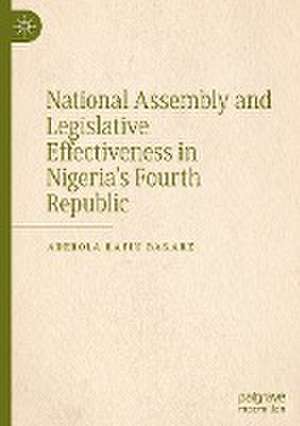National Assembly and Legislative Effectiveness in Nigeria’s Fourth Republic
Autor Adebola Rafiu BAKAREen Limba Engleză Hardback – 29 iul 2023
Preț: 699.28 lei
Preț vechi: 822.68 lei
-15% Nou
Puncte Express: 1049
Preț estimativ în valută:
133.81€ • 140.06$ • 111.37£
133.81€ • 140.06$ • 111.37£
Carte tipărită la comandă
Livrare economică 01-15 aprilie
Preluare comenzi: 021 569.72.76
Specificații
ISBN-13: 9789819907793
ISBN-10: 9819907799
Ilustrații: XXII, 256 p. 22 illus., 3 illus. in color.
Dimensiuni: 148 x 210 mm
Greutate: 0.49 kg
Ediția:1st ed. 2023
Editura: Springer Nature Singapore
Colecția Palgrave Macmillan
Locul publicării:Singapore, Singapore
ISBN-10: 9819907799
Ilustrații: XXII, 256 p. 22 illus., 3 illus. in color.
Dimensiuni: 148 x 210 mm
Greutate: 0.49 kg
Ediția:1st ed. 2023
Editura: Springer Nature Singapore
Colecția Palgrave Macmillan
Locul publicării:Singapore, Singapore
Cuprins
Chapter One: Concept, Origin and Significance of Legislature in Democratic Governance.- Chapter Two: Historical Development and the Institutional Framework of the Nigerian National Assembly.- Chapter Three: Legislative Powers and Lawmaking Process in the Nigerian National Assembly.- Chapter Four: Legislative Effectiveness: A Discourse on Measuring Toolkits, Benchmarks and Indicators.- Chapter Five: Measuring Legislative Effectiveness in the Nigerian National Assembly: The Birth of ILES Model.- Chapter Six: Comparative Analysis of Legislative Effectiveness of the 4th - 8th National Assemblies.- Chapter Seven: Assessing the Legislative Effectiveness of the National Assembly: The ILES Model Approach.- Chapter Eight: Interpreting the Lawmaking Performance and Determinants of Legislative Effectiveness of the National Assembly.- Chapter Nine: Legislative Impact on the People and the Challenges facing the National Assembly.- Chapter Ten: Budgetary Process and other major Issues that have affected the National Assembly in the Fourth Republic.- Chapter Eleven: Interrogating Membership Distribution and the Cost of Running the National Assembly.- Chapter Twelve: Towards Reforming the National Assembly: A Discourse of Issues, Constraints and Way-Forward.
Notă biografică
Adebola Rafiu Bakare is lecturer at University of Ilorin, Department of Political Science, Ilorin, Nigeria.
Textul de pe ultima copertă
This book evaluates the legislative effectiveness of Nigeria’s National Assembly under the Fourth Republic. The assessment covers five Assemblies (4th–8th) and focuses specifically on lawmaking, cost of running the National Assembly, and the budget making process. It empirically assesses the effectiveness of the Nigerian national legislature beyond previous emotional and sentimental evaluations of the institution. It has developed a model ‘Institutional Legislative Effectiveness Score’ used in assessing the institutional performance of the National Assembly from two perspectives: first, by comparing the performances of the two chambers in the same Assembly; and second, by comparing the performances of the institution across Assemblies. Aside lawmaking, the book also covers the major topical issues that characterized public evaluation of the institution. These include: size of the institution, budgeting process, cost of funding the institution, and the debate on the appropriate way in reforming the National Assembly.Adebola Rafiu BAKARE is a lecturer and currently Head of the Department of Political Science, University of Ilorin, Ilorin, Nigeria.
Caracteristici
Empirically assesses effectiveness of the National Assembly over two years period covering five Assemblies Covers the major topical issues, such as budgeting, that characterized public evaluation of the institution Discusses implementable policy options and solutions for the reformation of the institution
